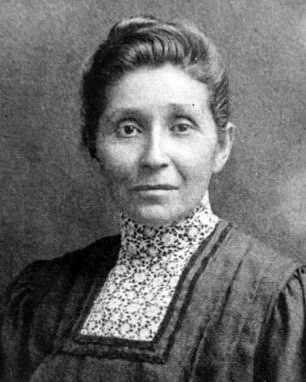Susan La Flesche Picotte - Healing Her People
Born: June 17, 1865, Omaha Reservation
Died: September 18, 1915, Walthill, Nebraska, U.S.A.
Susan La Flesche Picotte was the first Native American to earn a medical degree in the United States.
Susan was born on June 17, 1865, on the Omaha Reservation in northeastern Nebraska. Her father, Joseph La Flesche, also known as Iron Eye, had been chief of the Omaha people for twelve years. He believed that Native communities needed to prepare for the growing number of white settlers who were moving into Nebraska. Because of his views, Susan was taught both traditional Omaha values and the customs of European Americans. For example, she was not allowed to take part in some traditional ceremonies, and she was encouraged to speak Omaha only at home and English with outsiders.
When Susan was still a child, she witnessed something that would shape the rest of her life. She saw a sick Omaha woman denied medical treatment by a white doctor, simply because she was Native. The woman died without care. Susan never forgot that moment and decided she wanted to become a doctor so she could help her people.
Susan began her schooling at a reservation boarding school that focused on teaching Native children the culture and lifestyle of European Americans. Later, she attended the Elizabeth Institute in New Jersey before returning home to teach on the reservation. Soon after, she left again to study at the Hampton Institute in Virginia, where she graduated in 1886 as the salutatorian, or second-highest student in her class.
After Hampton, Susan was accepted to the Woman’s Medical College of Pennsylvania, one of the only places in the country at the time that trained women to be doctors. With support from the Connecticut Indian Association, which paid for her tuition, books, and housing, Susan completed her studies in just three years. She graduated at the very top of her class as valedictorian.
Right after graduation, Susan returned home to serve as the doctor at the government boarding school on the Omaha Reservation. But her work did not stop there. She began visiting families across the 450-square-mile reservation, traveling long distances by horse and buggy. She treated patients for illnesses like tuberculosis, influenza, and cholera. She also helped community members read legal documents, settle land disputes, and even write letters.
Susan’s medical work often crossed into public health and education. She believed strongly in preventing disease, not just treating it. One of her biggest concerns was alcoholism, which caused problems across the reservation and within her own family. Her husband, Henry Picotte, struggled with alcohol addiction, which eventually harmed his health. Susan spoke out against alcohol abuse and supported laws for prohibition, hoping to protect her people. Unfortunately, many white businessmen blocked these efforts by bribing voters with money and alcohol and using confusing ballots that took advantage of those who could not read English.
Susan was especially dedicated to fighting tuberculosis, which killed many members of her community, including her husband. In 1907, she asked the Office of Indian Affairs for help, but they turned her down, claiming they had no money. Still, Susan did not give up. As chair of the state health committee of the Nebraska Federation of Women’s Clubs, she worked to bring health education into schools. She encouraged practices like fresh air, covering one’s mouth when coughing, and keeping homes clean, which were the best defenses against tuberculosis at the time.
Susan’s greatest achievement came near the end of her life. After years of fundraising, she raised enough money in 1913 to build the first privately funded hospital on a Native reservation. The Dr. Susan Picotte Memorial Hospital opened in Walthill, Nebraska, becoming a symbol of her dedication to her community. Although Susan’s health was failing due to bone cancer, she lived long enough to see the hospital completed.
Susan La Flesche Picotte passed away in 1915 at the age of 50. Even though her life was short, her impact was enormous. She broke barriers as the first Native American doctor, cared for thousands of patients, and worked tirelessly to improve health and education for the Omaha people. Her hospital later became a museum and historic site, keeping her memory and legacy alive.
References:
“How Susan and Rosalie La Flesche Made Omaha History.” Smithsonian American Women’s History Museum, womenshistory.si.edu/blog/how-susan-and-rosalie-la-flesche-made-omaha-history.
“‘if You Knew the Conditions...’ Health Care to Native Americans: Susan La Flesche Picotte (1865-1915) First Native American Woman M.D.” U.S. National Library of Medicine, National Institutes of Health, www.nlm.nih.gov/exhibition/if_you_knew/ifyouknew_12.html.
Key words:
Science, Justice, Courage, Perseverance, Responsibility, Selflessness, Challenge Injustices, Make a Difference
Image Citation:
Public Domain
Explore ARTEFFECT projects about this Unsung Hero:
Susan La Flesche Picotte Artworks
Check out LMC Discovery Award Winning projects about this Unsung Hero:
Susan La Flesche Picotte - Discovery Award 2023
Susan La Flesche Picotte - Discovery Award 2025
- Collections: Art Gallery, Unsung Heroes

